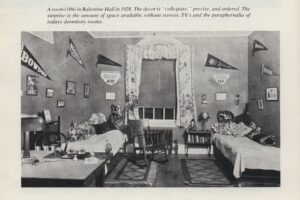Starring the wealthy and outgoing protagonist Emma Woodhouse, Jane Austen’s 1815 novel “Emma” has been a point of discussion in academic, social and personal contexts for over 200 years. With humorous and unique characters, stellar writing and intriguing plotlines, the reader takes a coming-of-age journey with Emma as she makes mistakes and learns from them. It is a novel flexible enough to be read either for pleasure or as an exercise in expanding your classic literature.
The foremost element that secured the popularity of “Emma” is Austen’s writing style. She employs numerous literary devices which sway readers in discreet ways that lead to delightful and sometimes jarring surprises. Her use of free indirect discourse, in which the reader is encouraged to hold a certain opinion through the manipulation of the voice of a narrator, is prevalent throughout. Austen’s ability to convey massive amounts of information in very few words is also a key element in “Emma.”
“Mr. Knightley, in fact, was one of the few people who could see faults in Emma Woodhouse, and the only one who ever told her of them,” Austen writes when introducing the relationship between Woodhouse and Knightley
In just this one sentence, the reader is informed of Knightley’s relationship with Woodhouse, Woodhouse’s relationship with herself and Woodhouse’s relationship with the people she is surrounded by. It is obvious from the beginning that she is spoiled, popular and used to getting her way.
Austen’s novel also revolves around unique characters. For the most part, Austen keeps these characters predictable. They rarely engage in any activities which could be construed as out of character. Miss Bates, for example, is extremely talkative and is often seen by Woodhouse as annoying. Knightley is proper and reserved, but will always say what’s on his mind, especially in regard to Woodhouse’s behavior. Austen’s ability to make the reader feel as if they are personally acquainted with the characters enhances the reading experience.
Further, Austen often leads her readers into holding opinions or ideas of these characters which later turn out to be false. One of the more intense deceptions of the novel is the nature of Jane Fairfax and her relationship to other characters. A polite, quiet and sickly girl, Fairfax engages in little conversation and is therefore not at the center of many social engagements. Towards the end of the novel, the reader discovers that Fairfax has, in fact, been in a secret engagement with Mr. Churchill for months. It is quite a scandal to the town and, therefore, to the reader.
Austen’s way of inserting humor in her writing is more roundabout, forcing readers to read between the lines. The mannerisms of Emma’s father, Mr. Henry Woodhouse, is often where Austen derives humor from. Even the introduction to the character of Henry Woodhouse centers around his anxiety about even the slightest of illnesses, as he pesters family friend Knightley about his half-mile walk during the night. It is little things like these that Woodhouse frets over, which brings light-hearted comedy to this coming-of-age novel.














